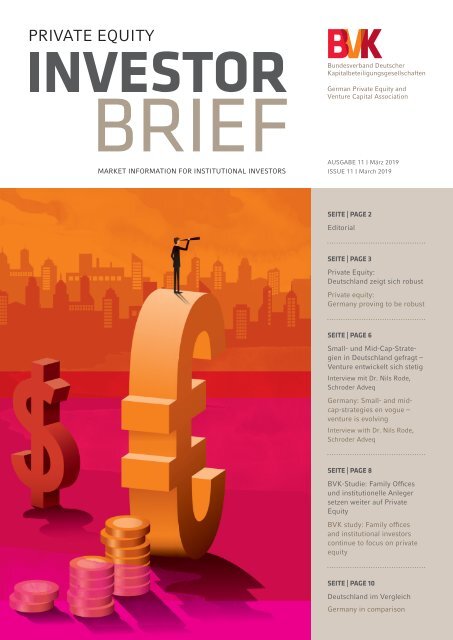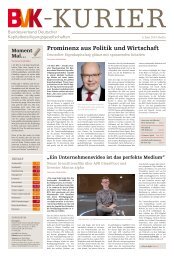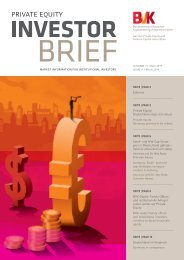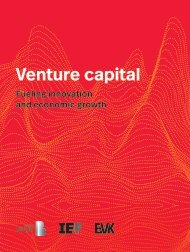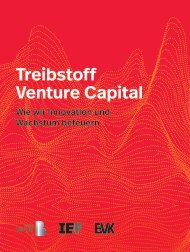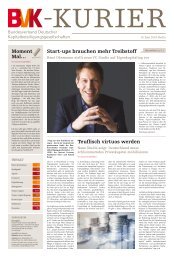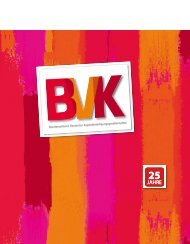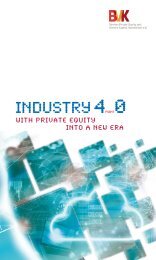BVK Investorenbrief RZ kurz
Create successful ePaper yourself
Turn your PDF publications into a flip-book with our unique Google optimized e-Paper software.
PRIVATE EQUITY<br />
MARKET INFORMATION FOR INSTITUTIONAL INVESTORS<br />
AUSGABE 11 | März 2019<br />
ISSUE 11 | March 2019<br />
SEITE | PAGE 2<br />
Editorial<br />
SEITE | PAGE 3<br />
Private Equity:<br />
Deutschland zeigt sich robust<br />
Private equity:<br />
Germany proving to be robust<br />
SEITE | PAGE 6<br />
Small- und Mid-Cap-Strategien<br />
in Deutschland gefragt –<br />
Venture entwickelt sich stetig<br />
Interview mit Dr. Nils Rode,<br />
Schroder Adveq<br />
Germany: Small- and midcap-strategies<br />
en vogue –<br />
venture is evolving<br />
Interview with Dr. Nils Rode,<br />
Schroder Adveq<br />
SEITE | PAGE 8<br />
<strong>BVK</strong>-Studie: Family Offices<br />
und institutionelle Anleger<br />
setzen weiter auf Private<br />
Equity<br />
<strong>BVK</strong> study: Family offices<br />
and institutional investors<br />
continue to focus on private<br />
equity<br />
SEITE | PAGE 10<br />
Deutschland im Vergleich<br />
Germany in comparison
EDITORIAL<br />
Ulrike Hinrichs, Geschäftsführendes Vorstandsmitglied<br />
des Bundesverbandes Deutscher Kapitalbeteiligungsgesellschaften<br />
Ulrike Hinrichs, Executive Board Member of the German<br />
Private Equity and Venture Capital Association<br />
Bereits zum elften Mal gibt der Bundesverband<br />
Deutscher Kapitalbeteiligungsgesellschaften (<strong>BVK</strong>)<br />
den Private Equity Investor Brief für institutionelle<br />
und private Investoren heraus, um pointiert über<br />
die neuesten Trends und Marktentwicklungen in<br />
der deutschen Venture Capital- und Private Equity-<br />
Landschaft zu informieren. Dabei greift der <strong>BVK</strong> mit<br />
seiner inzwischen 30-jährigen Geschichte auf einen<br />
breiten Erfahrungsschatz zurück.<br />
Verschiedene Investorenstudien zeigen: Die deutsche<br />
Private Equity-Branche liegt bei institutionellen<br />
Investoren weiter im Trend und deutsche Portfoliounternehmen<br />
– vom jungen, wachstumsstarken<br />
Tech-Unternehmen bis hin zum großen Mittelständler<br />
– bieten attraktive Anlagemöglichkeiten bei<br />
guten Renditechancen. Trotz globaler Herausforderungen,<br />
wie etwa internationaler Handelskonflikte<br />
oder der Unsicherheiten in der Europäischen Union<br />
infolge des Brexits, zeigt sich die Exportnation<br />
Deutschland als leistungsstärkste Volkswirtschaft<br />
Europas robust. Dies gilt ebenso für den deutschen<br />
Beteiligungsmarkt, der sich auch 2018 stabil zeigte.<br />
Insgesamt wurden 9,6 Milliarden Euro Private Equity<br />
und Venture Capital in rund 1.200 deutsche Unternehmen<br />
investiert.<br />
Der <strong>BVK</strong> bietet Ihnen mit seinen 300 Mitgliedern<br />
und mehr als 1.600 Geschäftskontakten einen idealen<br />
Zugang zum deutschsprachigen Beteiligungsmarkt.<br />
Für mehr Informationen zur Assetklasse deutsches<br />
Private Equity und Venture Capital wenden Sie sich<br />
daher gern an unseren Verband (Martin Bolits, Leiter<br />
Investor & International Relations, bolits@bvkap.de).<br />
Viel Spaß bei der Lektüre!<br />
The German Private Equity and Venture Capital<br />
Association (<strong>BVK</strong>) is publishing the eleventh issue<br />
of the Private Equity Investor Brief, a publication<br />
that provides institutional and private investors with<br />
information on the latest trends and market developments<br />
in the German venture capital and private<br />
equity industry. In doing so, <strong>BVK</strong> draws on the extensive<br />
experience it has gained from being in the business<br />
since thirty years.<br />
Different investor studies reveal: The German<br />
private equity industry is still in vogue among institutional<br />
investors, and German companies – from new,<br />
high-growth tech companies to major SMEs – offer<br />
attractive investment opportunities promising excellent<br />
returns. Despite global challenges such as international<br />
trade conflicts or the uncertainties in the<br />
European Union due to Brexit, Germany is proving<br />
to be a robust export nation as the most powerful<br />
economy in Europe. The same can be said about the<br />
German private equity market, which also developed<br />
stable in 2018. In total EUR 9.6 billion private equity<br />
and venture capital were invested in 1,200 companies.<br />
With its 300 members and more than 1,600 business<br />
contacts, <strong>BVK</strong> offers you the ideal way to access<br />
the German-speaking private equity market. For<br />
more information about the German private equity<br />
and venture capital asset class, please contact our<br />
association, the <strong>BVK</strong> (Martin Bolits, Head of Investor<br />
& International Relations, bolits@bvkap.de).<br />
We hope you enjoy reading!<br />
SEITE | PAGE 2
PRIVATE EQUITY: DEUTSCHLAND<br />
ZEIGT SICH ROBUST<br />
PRIVATE EQUITY: GERMANY<br />
PROVING TO BE ROBUST<br />
Die Anlageklasse deutsches Private Equity hat<br />
sich als sehr robust gegenüber externen Schocks<br />
wie etwa den internationalen Handelskonflikten und<br />
dem Brexit erwiesen. Gerade ein diversifiziertes<br />
Private Equity-Portfolio über verschiedene Marktsegmente,<br />
Regionen und Vintage-Jahre gilt unter<br />
Investoren als Stabilitätsanker innerhalb des Anlageportfolios,<br />
das sowohl in wirtschaftlichen Boomjahren<br />
als auch in schwierigen Zeiten attraktive<br />
Renditen liefert.<br />
Entsprechend haben in den letzten Jahren institutionelle<br />
Investoren, Family Offices, staatliche Einrichtungen<br />
und vermögende Privatanleger massiv in<br />
Private Equity- und Venture Capital-Fonds weltweit<br />
investiert. Aktuell wird das sogenannte Dry Powder<br />
insgesamt auf mehr als 1.500 Milliarden US-Dollar<br />
beziffert. In vielen Regionen wurden Rekordinvestitionen<br />
verzeichnet. Hier macht auch Deutschland<br />
keine Ausnahme, denn gerade auf Volkswirtschaften,<br />
die sich in der Vergangenheit als Stabilitätsfaktor<br />
und attraktiver Investitionsstandort erwiesen haben,<br />
richtet sich die Aufmerksamkeit von Private Equityund<br />
Venture Capital-Gesellschaften. Ob Wirtschaftskraft,<br />
Exporte, Direktinvestitionen, Internationalität,<br />
Wettbewerbs- oder Innovationsfähigkeit, bei<br />
entsprechenden Untersuchungen und Benchmarks<br />
findet sich Deutschland regelmäßig in der Spitzengruppe<br />
und macht das Land höchst attraktiv für<br />
Private Equity-Investoren.<br />
Großunternehmen, Mittelstand und Start-ups<br />
sorgen für einen international hervorragenden Ruf,<br />
dem in den vergangenen Jahren eine zunehmende<br />
Zahl ausländischer Investoren gefolgt ist. Heute<br />
investieren neben den mehr als 300 deutschen Beteiligungsgesellschaften<br />
so viele ausländische Beteiligungsgesellschaften<br />
in Deutschland wie noch nie<br />
in der Geschichte. Der Anteil ausländischer Investitionen<br />
und von Investitionen internationaler Beteiligungsgesellschaften<br />
über ihre deutschen Büros<br />
liegt bei mindestens zwei Drittel des Gesamtvolumens.<br />
Diese Entwicklung wird sich auf absehbare<br />
Zeit auch nicht ändern. Im PwC Private Equity Trend<br />
Report äußerten drei Viertel der befragten Senior<br />
Investment Professionals, dass Deutschland in den<br />
kommenden fünf Jahren noch attraktiver für Private<br />
Equity-Investitionen wird.<br />
Dementsprechend war 2017 für den deutschen<br />
Private Equity-Markt ein Rekordjahr. 11,7 Milliarden<br />
Euro wurden von Beteiligungsgesellschaften in mehr<br />
als 1.100 Unternehmen investiert. Das waren rund<br />
The German private equity asset class proved to be<br />
very robust when confronted by external shocks like<br />
international trade conflicts or Brexit. A diversified<br />
private equity portfolio, spanning different market<br />
segments, regions and vintage years, is exactly<br />
what is needed to provide stability among investors<br />
within the investment portfolio and promise attractive<br />
returns both in times of economic boom and<br />
economic bust.<br />
In recent years, huge investments have been<br />
pouring into private equity and venture capital funds<br />
around the world from institutional investors, family<br />
offices, grand institutions and high net-worth individuals.<br />
At the moment, the dry powder amounts<br />
to a total of more than USD 1,500 billion. Record<br />
investments have been made in many regions, and<br />
Germany is no exception. This is because precisely<br />
those economies that proved themselves to be a<br />
stable and attractive place to invest in the past<br />
receive all the attention from private equity and<br />
venture capital firms. Whether it is the strength of<br />
the economy, exports, direct investments, internationalisation,<br />
competitiveness or innovative strength,<br />
research and benchmark studies on the matter regularly<br />
put Germany among the world’s leading nations<br />
and make it an extremely attractive country for<br />
private equity investors.<br />
Large companies, SMEs and start-ups ensure<br />
the country enjoys an outstanding international<br />
reputation, which is why increasing numbers of<br />
international investors have been investing in<br />
Germany in recent years. Alongside the investments<br />
received from over 300 German private equity firms,<br />
more foreign private equity firms are investing<br />
in Germany today than ever before. Accordingly,<br />
the proportion of investments made by foreign<br />
private equity firms compared with their German<br />
counterparts has accounted for at least two-thirds<br />
of the total volume. And this trend is not about to<br />
Welche Region wird in den nächsten fünf Jahren zunehmend attraktiv<br />
für Private Equity-Gesellschaften?<br />
Which countries or regions will become more attractive for private<br />
equity investments over the next five years?<br />
Niederlande<br />
Netherlands<br />
Deutschland<br />
Germany<br />
Schweiz<br />
Switzerland<br />
Luxemburg<br />
Luxembourg<br />
UK<br />
UK<br />
Belgien<br />
Belgium<br />
Frankreich<br />
France<br />
USA<br />
USA<br />
76 %<br />
75 %<br />
68 %<br />
54 %<br />
49 %<br />
46 %<br />
46 %<br />
44 %<br />
SEITE | PAGE 3
zwei Drittel mehr als im Jahr zuvor (6,8 Milliarden<br />
Euro). Und auch das Jahr 2018 verlief erfolgreich und<br />
erreichte mit Investitionen von insgesamt 9,6 Milliarden<br />
Euro wieder ein starkes Investitionsergebnis.<br />
Beteiligungsgesellschaften spielen eine wesentliche<br />
Rolle bei der Finanzierung von Gründungen,<br />
jungen Unternehmen und Mittelständlern. Allein die<br />
<strong>BVK</strong>-Mitglieder erhalten jährlich mehr als 50.000<br />
Anfragen von Kapital suchenden Unternehmen.<br />
Mehr als 5.000 Unternehmen in Deutschland sind<br />
mit Beteiligungskapital finanziert. Neun von zehn<br />
finanzierten Unternehmen beschäftigen weniger als<br />
500 Mitarbeiter und auch 2018 wurden weit mehr als<br />
die Hälfte der im Jahresverlauf finanzierten Unternehmen<br />
mit Venture Capital unterstützt.<br />
Gerade im Venture Capital-Bereich hat Deutschland<br />
sich einen international hervorragenden Ruf<br />
erworben. Weltweit erfolgreiche Start-ups und nicht<br />
zuletzt die Berliner Gründerszene sorgen dafür, dass<br />
Investoren und Technologieunternehmen aus aller<br />
Welt ihren Blick stärker nach Deutschland richten.<br />
Als führender Forschungs- und Technologiestandort<br />
bietet Deutschland mit seiner vitalen Gründerszene<br />
eine große Zahl junger Unternehmen mit innovativen<br />
Geschäftsmodellen. Bereits in den Jahren<br />
2016 und 2017 wurden hierzulande mit 1,1 bzw. 1,3<br />
Milliarden Euro so viel Venture Capital durch Beteiligungsgesellschaften<br />
investiert, wie seit 2008 nicht<br />
mehr. Dieser positive Trend konnte 2018 fortgesetzt<br />
werden und mit knapp 1,4 Milliarden Euro wurde<br />
dieses Niveau sogar übertroffen.<br />
Innovation spielt eine tragende Rolle in der deutschen<br />
Wirtschaft. Da macht auch der deutsche Mittelstand<br />
keine Ausnahme. Zahlreiche Hidden Champions<br />
sind international in ihren Märkten führend und<br />
damit attraktive Investitionsziele für Private Equity-<br />
Minderheits- und -Mehrheitsbeteiligungen. Den Buy-<br />
Out-Markt dominieren in Deutschland Transaktionen<br />
PRIVATE EQUITY-INVESTITIONEN IN DEUTSCHLAND<br />
PRIVATE EQUITY INVESTMENTS IN GERMANY<br />
Investitionen in Mio. Euro<br />
investments in EUR m<br />
Quelle/Source: European Data<br />
Cooperative (EDC) / <strong>BVK</strong><br />
Stand: Februar 2019<br />
5.438<br />
7.309<br />
6.604<br />
6.786<br />
11.681<br />
9.597<br />
2013 2014 2015 2016 2017 2018<br />
change anytime soon. The Private Equity Trend<br />
Report from PwC showed that 75 % of senior<br />
investment professionals surveyed said that Germany<br />
would become even more attractive for private equity<br />
investments over the next five years.<br />
Correspondingly, 2017 was a record year for<br />
the German private equity market. Private equity<br />
firms invested EUR 11,7 billion in more than 1,100<br />
companies, an increase of almost two-thirds over<br />
the previous year (EUR 6.8 billion). Also 2018 was<br />
another successful investment year with total investments<br />
of EUR 9.6 billion.<br />
Private equity firms play a crucial role in the<br />
financing of start-ups, new companies and SMEs.<br />
<strong>BVK</strong> members alone receive more than 50,000<br />
requests a year from companies seeking capital.<br />
More than 5,000 companies in Germany are financed<br />
by private equity. Nine out of ten of the companies<br />
financed employ less than 500 people, and also in<br />
2018 much more than half of the companies financed<br />
over the course of the year received venture capital.<br />
The German venture capital market in particular<br />
has acquired an excellent international reputation.<br />
Internationally successful start-ups and, not least,<br />
the Berlin entrepreneurial scene have ensured a<br />
greater focus on Germany among investors and technology<br />
companies worldwide. As a global centre for<br />
research and technology and with its lively startup<br />
scene, Germany provides investors with a large<br />
number of young companies with innovative business<br />
models. Already in 2016 and 2017, in Germany EUR<br />
1.1 billion and EUR 1.3 billion of venture capital have<br />
been invested, a level of investments not seen since<br />
2008. This positive trend could be continued in 2018<br />
with venture capital investments reaching almost<br />
EUR 1.4 billion.<br />
Innovation plays a key role in the German economy<br />
and Germany’s SMEs are no exception. Numerous<br />
hidden champions in the SME sector are international<br />
leaders in their respective markets, making<br />
them attractive targets for minority and majority<br />
private equity investments. The German buyout<br />
market is dominated by transactions in the traditional<br />
SME sector. Only a small number of transactions in<br />
the segment relate to companies with a value of more<br />
than EUR 500 million. And when it comes to transactions<br />
involving traditional SMEs, German firms utilise<br />
their advantages, profiting from market access and<br />
knowledge to identify the best companies.<br />
The success of the German private equity firms is<br />
reflected in the amount of funds raised. In 2016 and<br />
2017, more than EUR 3 billion was raised each year<br />
and in 2018 fundraising totalled more than EUR 2.7<br />
billion, which is an impressive amount in light of the<br />
fact that the German sector does not possess funds<br />
worth billions. Almost twenty new funds have been<br />
closed in each of the last three years, meaning the<br />
private equity firms were able to record growing fund<br />
sizes. Regarding the independent managers of the<br />
new funds since 2016, this amounted to an average<br />
SEITE | PAGE 4
SELECTED SALES TO STRATEGIC BUYERS IN 2018<br />
Quelle/Source: Pressemeldungen, Unternehmensangaben /<br />
Press releases and other publicly accessible records<br />
INVESTORS<br />
COMPANY<br />
BUYER<br />
PRICE<br />
SHS, Bayern Kapital, BayBG, UVC Partners,<br />
IBG Sachsen-Anhalt, KfW / ERP-Startfonds<br />
AMW Arzneimittelwerk / pharma<br />
Hybio Pharmaceutical (China), YF<br />
Capital<br />
n.a.<br />
DBAG<br />
Cleanpart Group / semiconductors<br />
Mitsubishi Chemical Corporation (Japan)<br />
n.a.<br />
SHS, MBG Baden-Württemberg, VC-Fonds<br />
Baden-Württemberg<br />
EIT Emerging Implant<br />
Technologies / medical technology<br />
Johnson & Johnson Medical (USA)<br />
n.a.<br />
Highland Capital Partners, Acton Capital,<br />
HarbourVest, b-to-v Partners<br />
FFG FINANZCHECK / fintech<br />
Scout24 (Germany)<br />
285<br />
capiton<br />
Kautex Maschinenbau / machinery<br />
Plastech (Austria)<br />
n.a.<br />
VR Equitypartner,<br />
BIP Investment Partners<br />
Leuna-Tenside / chemical industry<br />
Vantage Specialty Chemicals<br />
Holdings (USA)<br />
n.a.<br />
Nord Holding<br />
Parador / flooring<br />
HILLimitedCK Birla (India)<br />
n.a.<br />
Deutsche Telekom Capital Partners, MVP,<br />
B37 Ventures, Purple Arch Ventures,<br />
Kleiner Perkins Caufield & Byers<br />
relayr / software, IoT<br />
HSB Hartford Steam Boilers (USA)<br />
Munich Re<br />
260<br />
NRW.Bank, Business Angels, anonymous<br />
family office, anonymous asset manager<br />
Shop.co / e-commerce<br />
Klarna (Sweden)<br />
n.a.<br />
MIG<br />
Siltectra / semiconductors<br />
Infineon (Germany)<br />
124<br />
Steadfast Capital<br />
Stanz- und Lasertechnik Jessen /<br />
metalworking<br />
Feintool International Holding<br />
(Switzerland)<br />
n.a.<br />
im klassischen Mittelstand. Nur wenige Übernahmen<br />
finden im Segment oberhalb von 500 Millionen Euro<br />
Unternehmenswert statt. Gerade bei den klassischen<br />
mittelständischen Transaktionen spielen die deutschen<br />
Gesellschaften ihre Vorteile aus und punkten<br />
mit Marktzugang und -kenntnis, um die besten<br />
Unternehmen zu identifizieren.<br />
Die erfolgreiche Arbeit deutscher Beteiligungsgesellschaften<br />
schlägt sich auch im Fundraising nieder.<br />
In den Jahren 2016 und 2017 wurden jeweils mehr<br />
als 3 Milliarden Euro eingesammelt, im Jahr 2018<br />
waren es gut 2,7 Milliarden Euro, was angesichts<br />
der heimischen Branche, die über keine milliardenschweren<br />
Fonds verfügt, ein beachtlicher Erfolg ist.<br />
Jeweils rund 20 neue Fonds wurden in den letzten<br />
drei Jahren geschlossen. Dabei konnten die Beteiligungsgesellschaften<br />
auch steigende Fondsgrößen<br />
verzeichnen. Mit Blick auf die neuen Fonds unabhängiger<br />
Manager seit 2016 lag diese für Venture<br />
Capital durchschnittlich bei 170 Millionen Euro und<br />
für den Buy-Out-Bereich bei 340 Millionen Euro.<br />
Das zunehmende Investoreninteresse an deutschen<br />
Fonds ist auch einem wettbewerbsfähigen<br />
Track Record zu verdanken. Deutsche Unternehmen<br />
allgemein und Portfoliounternehmen im Besonderen<br />
sind deshalb attraktive Übernahmeziele für<br />
strategische Investoren aus dem In- und Ausland<br />
und bescherten den Beteiligungsgesellschaften<br />
und ihren Fondsinvestoren attraktive Renditen. In<br />
den letzten fünf Jahren wurden jeweils rund 100<br />
entsprechende Verkäufe registriert, darunter auch<br />
30 IPOs.<br />
of EUR 170 million for venture capital and EUR 340<br />
million for the buyout sector.<br />
The rise in interest in German funds from investors is<br />
also due to a competitive track record. German companies<br />
in general and portfolio companies in particular<br />
are therefore attractive targets for transactions for<br />
strategic investors from Germany and abroad, allowing<br />
private equity firms and their fund investors to achieve<br />
competitive returns. Around 100 corresponding sales<br />
have been registered in each of the last five years, 30<br />
of them were floated on the stock exchange.<br />
BUY-OUTS IN DEUTSCHLAND NACH<br />
INVESTITIONSGRÖSSE<br />
GERMAN BUYOUTS BY SIZE<br />
11<br />
8<br />
6<br />
45<br />
44<br />
76<br />
71 67 43<br />
14<br />
81<br />
2014 2015 2016 2017 2018<br />
8<br />
88<br />
70 54<br />
Große Transaktionen<br />
(Investition > 150 Mio. Euro)<br />
Large buyouts (equity<br />
investment EUR > 150 m)<br />
Mittlere Transaktionen<br />
(Investition 15-150 Mio. Euro)<br />
Mid-marked buyouts (equity<br />
investment EUR 15-150 m)<br />
Kleine Transaktionen<br />
(Investition < 15 Mio. Euro)<br />
Small buyouts (equity<br />
investment EUR < 15 m)<br />
Quelle: European Data<br />
Cooperative (EDC) / <strong>BVK</strong><br />
Stand: Februar 2019<br />
SEITE | PAGE 5
SMALL- UND MID-CAP-STRATEGIEN IN<br />
DEUTSCHLAND GEFRAGT – VENTURE<br />
ENTWICKELT SICH STETIG<br />
GERMANY: SMALL- AND MID-CAP-<br />
STRATEGIES EN VOGUE – VENTURE IS<br />
EVOLVING<br />
INTERVIEW:<br />
DR. NILS RODE<br />
Dr. Nils Rode ist Chief Investment Officer von<br />
Schroder Adveq und Mitglied des Investment Committees.<br />
Schroder Adveq ist als 100%ige Private Equity-<br />
Tochter von Schroders Plc, einer der führenden Private<br />
Equity Investment Manager weltweit. Schroders<br />
verwaltet mehr als 590 Milliarden US-Dollar, davon<br />
mehr als 30 Milliarden US-Dollar im Bereich Private<br />
Assets.<br />
Dr. Nils Rode is Chief Investment Officer of Schroder<br />
Adveq and a member of the Investment Committee.<br />
Schroder Adveq, the wholly owned private equity<br />
platform of Schroders Plc, is a leading private equity<br />
investment manager globally. Schroders manages<br />
more than USD 590 billion, of which more than USD<br />
30 billion is in private assets.<br />
WELCHE ROLLE SPIELT PRIVATE<br />
EQUITY AKTUELL FÜR INSTITUTIONELLE<br />
INVESTOREN?<br />
WHAT ROLE DOES PRIVATE EQUITY<br />
CURRENTLY PLAY FOR INSTITUTIONAL<br />
INVESTORS?<br />
Das Interesse institutioneller Anleger an Private<br />
Equity steigt weltweit weiter an. Dies ist getrieben<br />
durch die bislang realisierten Renditen und weiterhin<br />
hohen Renditeerwartungen, aber auch durch die in<br />
der Vergangenheit erzielte niedrige Volatilität von<br />
Private Equity und durch das Diversifikationspotenzial<br />
der Assetklasse. Investoren legen zudem immer<br />
mehr Gewicht auf das Thema Nachhaltigkeit/ESG,<br />
welches durch Private Equity besonders gut umgesetzt<br />
werden kann. Hierzu tragen die hohe Selektivität<br />
in dieser Assetklasse sowie der große Einfluss<br />
der Fondsmanager auf ihre Portfoliounternehmen<br />
bei.<br />
Institutional investors’ interest in private equity<br />
is growing worldwide. This is driven by the high<br />
realised returns seen in the past and return<br />
expectations for the future, the low volatility inherent<br />
with private equity, as well as its diversification<br />
benefits. Investors also place increasing emphasis on<br />
the topic of sustainability/ESG, where private equity<br />
is well placed to make advances due to the high<br />
selectivity of investments and the strong influence of<br />
fund managers on their portfolio companies.<br />
SEITE | PAGE 6
WO SEHEN SIE GEGENWÄRTIG DIE<br />
GRÖSSTEN CHANCEN INNERHALB VON<br />
PRIVATE EQUITY?<br />
WHERE DO YOU CURRENTLY SEE THE<br />
GREATEST OPPORTUNITIES WITHIN<br />
PRIVATE EQUITY?<br />
Langfristig ist in allen Private Equity-Strategien<br />
eine anhaltend hohe Wertschöpfung zu erwarten, die<br />
von den strukturellen Vorteilen von Private Equity<br />
gegenüber anderen Governance- und Investitionsmodellen<br />
profitiert. Während Vintagejahr-Diversifikation<br />
weiterhin wichtig bleibt, macht es durchaus Sinn,<br />
auch zyklische Überlegungen bei Neuinvestitionen<br />
nicht außer Acht zu lassen. Unser firmeneigener<br />
quantitativer Frühindikator für Private Equity-Vintagejahr-Performance,<br />
der Schroder Adveq FRI, deutet<br />
darauf hin, dass für Neuinvestitionen gegenwärtig die<br />
Bedingungen in den Märkten für kleine / mittlere Buy-<br />
Outs, Venture-Frühphasenfinanzierungen und für<br />
Investitionen in bestimmten Schwellenländern besonders<br />
günstig sind. Aus Branchensicht ist gegenwärtig<br />
u.a. der Gesundheitssektor besonders interessant.<br />
Over the long term, private equity strategies<br />
will continue to be an important value creator for<br />
investors as they benefit from structural advantages<br />
compared to other governance and investment<br />
models. Although vintage year diversification<br />
remains important, it is recommended to consider<br />
cyclical factors for new investments. We have developed<br />
a proprietary quantitative tool, Schroder Adveq<br />
FRI, to provide early indication of private equity<br />
vintage year performance. It highlights that for<br />
new investments, market conditions are currently<br />
favourable for small/medium-sized buyouts, early<br />
stage venture funding and investments in specific<br />
emerging markets. From a sectoral perspective, the<br />
healthcare industry is particularly interesting.<br />
WELCHEN STELLENWERT NIMMT<br />
DER DEUTSCHE MARKT IN DIESEM<br />
ZUSAMMENHANG EIN?<br />
WHAT IS THE SIGNIFICANCE<br />
OF THE GERMAN MARKET IN THIS<br />
CONTEXT?<br />
Deutschland ist aufgrund der hohen Anzahl mittelständischer<br />
Unternehmen und der Vielzahl von<br />
Unternehmenssituationen mit Nachfolgethematiken<br />
insbesondere für kleine und mittlere Buy-Out-Strategien<br />
sehr attraktiv. Diese machen einen Großteil des<br />
Dealflows aus, insbesondere bei kleineren Unternehmen.<br />
Außerdem finden sich in Deutschland viele<br />
Unternehmen mit internationalen, oft technologiebasierten<br />
Wettbewerbsvorteilen. Daneben sehen wir<br />
eine stetige Entwicklung im Bereich Venture Capital,<br />
welche im Einklang mit dem Wachstum des globalen<br />
Venture Capital-Marktes steht.<br />
Germany is especially attractive for small and<br />
medium-sized buyout strategies because of the large<br />
number of medium-sized companies and the variety<br />
of corporate situations with succession issues. These<br />
make up a majority of the deal flow, specifically<br />
among smaller companies. Moreover, in Germany<br />
there are many companies with international, often<br />
technology-based competitive advantages. In addition,<br />
we see steady development in the venture<br />
capital field, which is in line with the growth of the<br />
global venture capital market.<br />
SEITE | PAGE 7
<strong>BVK</strong>-STUDIE: FAMILY OFFICES UND<br />
INSTITUTIONELLE ANLEGER SETZEN<br />
WEITER AUF PRIVATE EQUITY<br />
<strong>BVK</strong> STUDY: FAMILY OFFICES AND<br />
INSTITUTIONAL INVESTORS CONTINUE<br />
TO FOCUS ON PRIVATE EQUITY<br />
Wie hat sich Ihre Private Equity-Allokation in den vergangenen<br />
12 Monaten verändert?<br />
How has your allocation to private equity changed in the past 12 months?<br />
Private Equity spielt nach wie vor eine wichtige<br />
Rolle: Neun von zehn Family Offices und Stiftungen<br />
haben eine Private Equity-Quote von mehr als 10 %<br />
ihres Vermögens, dagegen nur 23 % der regulierten<br />
Investoren. Laut der inzwischen sechsten Investorenbefragung<br />
von Montana Capital Partners (mcp)<br />
wollen über 90 % der befragten Family Offices und<br />
institutionellen Anleger ihre Private Equity-Allokation<br />
in den nächsten zwölf Monaten beibehalten oder<br />
erhöhen. Dabei hatte nahezu jeder zweite Befragte<br />
seine Private Equity-Allokation bereits in den letzten<br />
zwölf Monaten erhöht. Die Mehrheit der institutionellen,<br />
regulierten Anleger weist dagegen einen<br />
Private Equity-Anteil von 1 bis 5 % in ihren Portfolios<br />
aus. Den Studienautoren zufolge zeigt dies,<br />
dass nicht-regulierte Investoren von höheren Private<br />
Equity-Quoten profitieren können.<br />
Wie in den Vorgängerstudien sind Investitionen<br />
in Fonds mit einem Fokus auf mittelgroße Buy-Outs<br />
am beliebtesten. 90 % aller Befragten bezeichnen<br />
diese als eine ihrer bevorzugten Anlagen, gefolgt von<br />
Secondaries mit 55 %.<br />
Hinsichtlich Venture Capital und großen Buy-<br />
Outs zeigen sich Unterschiede zwischen den Investorengruppen.<br />
Während jedes zweite Family Office<br />
Venture Capital zu den Kernanlagen zählt, sind es bei<br />
den institutionellen Investoren nur 35 %. Auf Large<br />
Buy-Outs setzen dagegen 51 % der Institutionellen,<br />
aber nur 28 % der Family Offices und Stiftungen.<br />
Unverändert<br />
It stayed the<br />
same<br />
46 %<br />
Gesunken<br />
It decreased<br />
3 %<br />
Allokation<br />
erstmals<br />
vorgenommen<br />
We introduced<br />
an allocation for<br />
the first time<br />
3 %<br />
Keine Allokation<br />
We have no<br />
allocation<br />
2 %<br />
Gestiegen<br />
It increased<br />
46 %<br />
Die Hauptsorge der Investoren sind die hohen<br />
Bewertungen, zu denen Beteiligungsgesellschaften<br />
derzeit Beteiligungen übernehmen. Zudem beunruhigt<br />
viele Investoren ein möglicher wirtschaftlicher<br />
Abschwung, der zu sinkendem Gewinnwachstum bei<br />
den Unternehmen führt.<br />
Die große Mehrheit der Investoren glaubt allerdings<br />
nicht, dass politische Entwicklungen die<br />
Performance ihrer Private Equity-Anlagen oder<br />
ihre Allokation zur Assetklasse negativ beeinflussen<br />
werden. Neun von zehn Investoren beider Gruppen<br />
erwarten auch zukünftig Netto-Renditen von mehr<br />
als 10 %, vier von zehn sogar von mehr als 15 %.<br />
Wie wird sich die Allokation in den nächsten 12 Monaten ändern?<br />
How do you expect allocation to change in the coming 12 months?<br />
Zunehmen<br />
It will increase<br />
32 %<br />
Abnehmen<br />
It will decrease<br />
4 %<br />
Keine Allokation<br />
vorgesehen<br />
We have no<br />
allocation<br />
2 %<br />
Gleichbleibend<br />
It will stay the<br />
same<br />
62 %<br />
COLLER BAROMETER:<br />
INVESTOREN ERWARTEN HÖHERE<br />
VENTURE CAPITAL-RENDITEN<br />
Die Renditeerwartungen von LPs für Venture<br />
Capital haben sich in den letzten fünf Jahren deutlich<br />
verbessert. Laut Coller Barometer erwarten<br />
zwei Drittel der LPs für die nächsten drei bis fünf<br />
Jahre europäische Venture Capital-Renditen von<br />
jährlich mehr als 11 % netto. Für Nordamerika sind<br />
es sogar 84 % und für Asien 78 % der Investoren.<br />
Die zwischenzeitliche Verbesserung der Gesamtrendite<br />
ist besonders deutlich im untersten Bereich<br />
erkennbar. Während vor fünf Jahren noch mehr als<br />
ein Drittel der LPs eine Nettorendite von 5 % oder<br />
weniger für Europa erwartete, liegt deren Anteil<br />
heute bei nur noch 8 %. Aber auch der Anteil der<br />
LPs, die eine Rendite von 16 % und mehr erwarten,<br />
hat sich auf fast ein Drittel verdoppelt.<br />
SEITE | PAGE 8
According to a new survey published by Montana<br />
Capital Partners (mcp) private equity continues to<br />
play a very important role: Nine out of ten family<br />
offices and foundations report an allocation to<br />
private equity above 10 %, compared to only 23 %<br />
of regulated investors. Over 90 % of family offices<br />
and institutional investors will either maintain or<br />
increase their private equity allocation. Almost half<br />
of respondents had already increased their private<br />
equity exposure in the last twelve months. The<br />
majority of institutional investors reports an allocation<br />
to private equity of 1 to 5 %. This shows that<br />
non-regulated investors are able to profit from larger<br />
allocations to private equity.<br />
As in previous surveys, investments in funds with<br />
a focus on mid-market buyouts continue to be the<br />
preferred investment strategy, with 90 % of respondents<br />
selecting it as one of the core strategic preferences,<br />
followed by secondaries with 55 %.<br />
With regard to venture capital and large buyouts,<br />
there are differences between the investor groups.<br />
While every second family office reports venture<br />
capital is one of the core investments, the figure for<br />
institutional investors is only 35 %. By contrast, 51<br />
% of institutional investors rely on large buyouts, but<br />
only 28 % of family offices and foundations.<br />
Surveyed investors indicate that GPs buying into<br />
companies at too high valuations is their biggest<br />
concern. Additionally, a possible economic slowdown<br />
leading to a decreasing earnings growth was<br />
another high-ranking concern across all investor<br />
types.<br />
The vast majority of investors are not concerned<br />
about a negative impact of political changes on the<br />
performance of private equity and their allocation to<br />
the asset class. Nine out of ten respondents across<br />
both investor types expect to achieve net returns of<br />
more than 10 %, and around four out of ten expect<br />
more than 15 %.<br />
COLLER BAROMETER:<br />
INVESTORS EXPECT INCREASING<br />
VENTURE CAPITAL RETURNS<br />
LPs’ return expectations for venture capital<br />
have improved significantly in the last five years.<br />
According to the latest Coller Barometer, two thirds<br />
of LPs forecast annual European venture capital<br />
returns of more than 11 % net over the next 3 to 5<br />
years. In North America it is even 84 % and in Asia<br />
78 % of the investors.<br />
The improvement in overall returns in the meantime<br />
is particularly striking in the lowest band.<br />
Whereas five years ago more than a third of LPs<br />
expected a net return of 5 % or less for Europe,<br />
today the share is only 8 %. But also the share of LPs<br />
that expect a return of 16 % or more has doubled to<br />
almost a third.<br />
Was sind Ihre langfristigen strategischen Präferenzen?<br />
What are your long-term strategic preferences?<br />
94<br />
0<br />
92<br />
Mid-market<br />
buyout<br />
0<br />
Less than<br />
5%<br />
56<br />
3<br />
57<br />
Secondaries<br />
8<br />
50<br />
59<br />
35<br />
Venture<br />
capital<br />
Welche aktuellen Renditeerwartungen (netto)<br />
haben Sie bei Fondsinvestments?<br />
52<br />
39 43<br />
36<br />
Private dept Distressed /<br />
turnaround<br />
What is your return expectation for private equity<br />
(net to investors) when you invest in primary funds?<br />
Family Offices/Stiftungen<br />
Family offices/foundations<br />
5-10% 10-15% 15-20% 20-25% More than<br />
25%<br />
Jährliche Netto-Rendite aus Venture Capital über die kommenden<br />
3-5 Jahre – LP-Prognose<br />
Annual net returns from VC over the next 3-5 years – LP forecasts<br />
Jährliche<br />
Nettorendite;<br />
% der Befragten<br />
Annual net<br />
returns;<br />
% respondents<br />
3<br />
13<br />
19<br />
29<br />
36<br />
Winter 2013-14<br />
32<br />
37<br />
5<br />
Institutionelle Investoren<br />
Institutional investors<br />
6<br />
27<br />
32<br />
27<br />
8<br />
Winter 2018-19<br />
51 51<br />
4<br />
28<br />
Large<br />
buyout<br />
0<br />
0<br />
More than 20%<br />
16-20%<br />
11-15%<br />
5-10%<br />
Less than 5%<br />
SEITE | PAGE 9
DEUTSCHLAND IM VERGLEICH<br />
GERMANY IN COMPARISON<br />
12<br />
Nr. 12 in Europa gemessen<br />
am Verhältnis der gesamten<br />
Private Equity-Investitionen zum<br />
nationalen BIP.<br />
#12 European country by total private<br />
equity investments in relation to<br />
national GDP.<br />
HINSICHTLICH PRIVATE<br />
EQUITY IST DEUTSCHLAND<br />
DIE ...<br />
GERMAN PRIVATE EQUITY<br />
MARKET IS THE ...<br />
DEUTSCHLAND IST DIE ...<br />
GERMANY IS THE ...<br />
3<br />
Nr. 3 der europäischen<br />
Länder, gemessen an der<br />
Anzahl der einheimischen Private-<br />
Equity-Gesellschaften.<br />
#3 European country by number of<br />
headquartered of private equity firms.<br />
3<br />
Nr. 3 der europäischen<br />
Länder, gemessen am<br />
Private Equity-Investitionsvolumen<br />
des Jahres 2017, allerdings nur die ...<br />
#3 European country by private<br />
equity investment volume in 2017,<br />
but it is only the ...<br />
9<br />
Nr. 9 in Europa gemessen<br />
am Verhältnis der Venture<br />
Capital-Investitionen zum nationalen<br />
BIP.<br />
#9 European country by venture<br />
capital investments in relation to<br />
national GDP.<br />
5<br />
Nr. 5 der europäischen<br />
Länder, gemessen am<br />
Fundraising der letzten fünf Jahre.<br />
#5 European country by private<br />
equity funds raised during the last<br />
five years.<br />
1 1 1<br />
Nr. 1 der europäischen Länder<br />
nach Umsatz im Maschinenbau<br />
(Nr. 3 weltweit).<br />
#1 European country in the<br />
machinery sector (#3 worldwide).<br />
Nr. 1 der europäischen Länder in<br />
Bezug auf erteilte Patente für Europa<br />
(Nr. 2 aller Länder).<br />
#1 European country in patents filed<br />
for Europe (#2 of all countries).<br />
Nr. 1 der europäischen Länder<br />
hinsichtlich der nominalen Ausgaben<br />
für Forschung und Entwicklung<br />
(Nr. 4 weltweit).<br />
#1 European country in nominal R&D<br />
expenditures (#4 worldwide).<br />
1 3 1<br />
Nr. 1 der europäischen Länder<br />
hinsichtlich der nominalen Unternehmensausgaben<br />
für Forschung und<br />
Entwicklung.<br />
#1 European country in nominal business<br />
enterprise R&D expenditures.<br />
Nr. 3 der europäischen Länder nach<br />
der Anzahl der Hightech-Unternehmen.<br />
#3 European country by high-tech<br />
companies.<br />
Nr. 1 der europäischen Länder nach<br />
Umsatz im Hightech-Sektor.<br />
#1 European country by turnover<br />
in high-tech sectors.<br />
1 2 3<br />
Nr. 1 der europäischen Länder nach<br />
Export und Import (Nr. 3 weltweit)<br />
und Nr. 1 weltweit nach Leistungsbilanzüberschuss.<br />
#1 European country by exports and<br />
imports (#3 worldwide) and #1 worldwide<br />
by current account surplus.<br />
Nr. 2 der europäischen ITK-Märkte<br />
bezogen auf den Umsatz (Nr. 5 weltweit).<br />
#2 European ITC market by sales<br />
(#5 worldwide).<br />
Nr. 3 der europäischen Länder<br />
gemessen an der Anzahl der Biotech-<br />
Unternehmen (Nr. 5 weltweit).<br />
#3 European country by number of<br />
biotech companies (#5 worldwide).<br />
SEITE | PAGE 10
30 Jahre <strong>BVK</strong> – 20 Jahre Deutscher Eigenkapitaltag:<br />
Am 4. Juni 2019 bringt der Bundesverband Deutscher<br />
Kapitalbeteiligungsgesellschaften (<strong>BVK</strong>) rund 300<br />
führende Persönlichkeiten aus Politik, Medien, Wirtschaft<br />
und Wissenschaft zusammen auf der größten<br />
deutschsprachigen Beteiligungskapitalkonferenz. Es<br />
sprechen u.a. der Bundes minister für Wirtschaft und<br />
Energie, Peter Altmaier MdB, General David Petraeus<br />
und Unternehmer Dirk Rossmann. Zudem gibt es spannende<br />
Panels und Powertalks rund um die Themen der<br />
Beteiligungsbranche, Business-Corner, LP/GP-Cocktail<br />
Reception und viele weitere Höhepunkte.<br />
Im Forum der Zukunft, der Hauptstadtrepräsentanz<br />
der Deutschen Telekom, schaut der <strong>BVK</strong> in<br />
der Diskussion mit den Finanzpolitikern nach vorn<br />
und thematisiert die Bedürfnisse der Branche. Im<br />
Rahmen seines Jubiläums wirft der Verband auch<br />
einen Blick zurück auf 30 Jahre Verbandsgeschichte<br />
und Beteiligungskapitalbranche in Deutschland –<br />
30 Jahre voller Chancen, Investitionen und Wach stum.<br />
DATUM | DATE<br />
4. Juni 2019 | 09:30 – 17:00 Uhr<br />
2019, June 4 | 09:30 am - 05:00 pm<br />
ORT | LOCATION<br />
Hauptstadtrepräsentanz der Deutschen<br />
Telekom | Französische Straße 33 a-c<br />
10117 Berlin<br />
20. DEUTSCHER EIGENKAPITALTAG<br />
20 TH GERMAN EQUITY DAY<br />
30 years of <strong>BVK</strong> – 20 years of German Equity<br />
Day: On 4 June 2019, the German Private Equity<br />
and Venture Capital Association (Bundesverband<br />
Deutscher Kapitalbeteiligungsgesellschaften – <strong>BVK</strong>)<br />
will bring together some 300 leading personalities<br />
from politics, the media, business and science<br />
at the largest German private equity conference.<br />
Speakers will include the German Federal Minister<br />
for Economic Affairs and Energy, Peter Altmaier<br />
MdB, and entrepreneur Dirk Rossmann. The conference<br />
will also feature exciting panels and power talks<br />
about the private equity sector, business corners, an<br />
LP/GP cocktail reception and many other highlights.<br />
<strong>BVK</strong> and financial policy makers will be sitting<br />
down together at the future forum, Deutsche Telekom’s<br />
representative office in the German capital,<br />
to discuss what lies ahead and address the sector’s<br />
needs. Within the scope of its anniversary, <strong>BVK</strong> will<br />
also look back on 30 years of its history and that of<br />
the German private equity sector – 30 years packed<br />
full of opportunities, investments and growth.<br />
ANMELDUNG | REGISTRATION<br />
www.DET2019.bvkap.de<br />
20. DEUTSCHER<br />
EIGENKAPITALTAG<br />
20 TH GERMAN PRIVATE<br />
EQUITY DAY
KONTAKT | CONTACT DETAILS<br />
Mit dieser Publikation<br />
informieren wir Sie regelmäßig<br />
über aktuelle Entwicklungen<br />
der Private Equity-Branche in<br />
Deutschland.<br />
This publication provides you<br />
with regular updates about<br />
the latest developments in<br />
the private equity sector in<br />
Germany.<br />
Mehr als<br />
5.000<br />
Portfoliounternehmen<br />
More than 5,000<br />
portfolio companies<br />
1 Million<br />
Beschäftigte<br />
1 Million<br />
employees<br />
194 Mrd.<br />
€ Umsatz<br />
194 billion Euro<br />
sales / year<br />
in<br />
Deutschland.<br />
in Germany.<br />
POSTADRESSE |<br />
POSTAL ADDRESS<br />
Bundesverband Deutscher<br />
Kapitalbeteiligungsgesellschaften<br />
e.V.<br />
German Private Equity and<br />
Venture Capital Association e.V.<br />
(<strong>BVK</strong>)<br />
Reinhardtstraße 29b<br />
10117 Berlin, Germany<br />
REDAKTION | EDITORS<br />
Martin A. Bolits – V.i.S.d.P.<br />
Janine Heidenfelder<br />
Attila Dahmann<br />
V.I.S.D.P. | RESPONSIBLE UNDER<br />
THE GERMAN PRESS LAW<br />
Ulrike Hinrichs<br />
<strong>BVK</strong> Bundesverband<br />
Deutscher Kapitalbeteiligungsgesellschaften<br />
@wir_investieren<br />
@wirinvestieren<br />
@wir_investieren<br />
Es gibt mehr als<br />
There are about<br />
300<br />
2018<br />
9,6<br />
1.200<br />
In<br />
EUR<br />
42<br />
Milliarden<br />
EUR<br />
Beteiligungsgesellschaften in Deutschland.<br />
private equity firms in Germany.<br />
wurden<br />
have been invested<br />
Milliarden Euro in rund<br />
billion in more than<br />
Unternehmen investiert.<br />
German companies.<br />
Zwischen 2014 und 2018 wurden rund<br />
Between 2014 and 2018,<br />
Euro in Deutschland investiert.<br />
billion have been invested in Germany.


